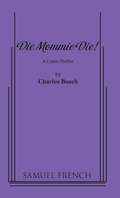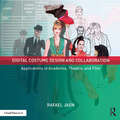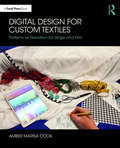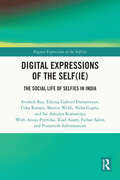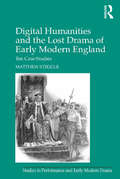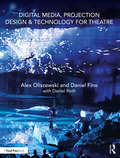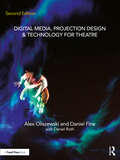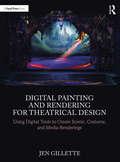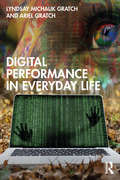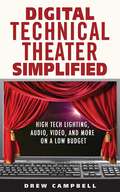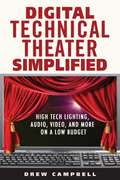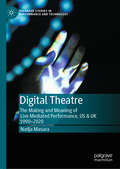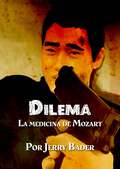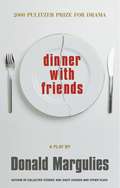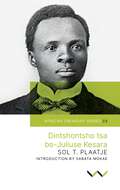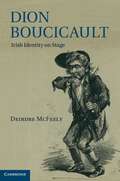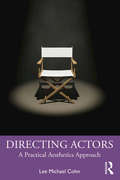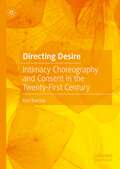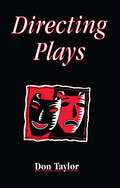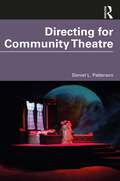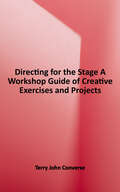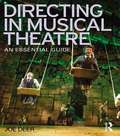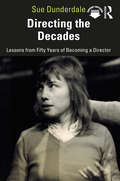- Table View
- List View
Die Mommie Die!
by Charles BuschComic melodrama. . Little Theatre. . Characters: 3 male. 3 female. . Interior set. . Newly revised! This comic melodrama evokes the 1960's movie thrillers that featured such aging cinematic icons as Bette Davis, Joan Crawford, Lana Turner and Susan Hayward. Faded pop singer, Angela Andrews, is trapped in a corrosive marriage to film producer, Sol Sussman. In her attempt to find happiness with her younger lover, an out of work TV star, Angela murders her husband with the aid of a poisoned suppository. In a plot that reflects both Greek tragedy as well as Hollywood folklore, Angela's resentful daughter, Edith, convinces Angela's emotionally disturbed son, Lance, to avenge their father's death by killing their mother. Lance, demanding proof of Angela's crime, slips some LSD into her after-dinner coffee, triggering a wild acid trip that exposes all of Angela's dark secrets.
Die Wahrheit Über Amelia
by Rony Fernando GonzalezEs geschah, als Compay Miguel sah, wie die Kinder seines besten Freundes gefangen wurden, und auch die anderen, die in seiner Gegend aufgewachsen waren: In einer Attacke väterlicher Verantwortung zog er die Machete hervor und wollte den Kommandanten von hinten niedermachen. Doch da nahm ihm eine meuchlerische Feuersalve das Leben.
Digital Costume Design and Collaboration: Applications in Academia, Theatre, and Film
by Rafael JaenDigital Costume Design and Collaboration gives in-depth instruction on how to draw, render, and fully design costumes using online tools and software. Grounded in the use of Photoshop, the book explains the process of building a costume design from scratch, including information on digital tools and painting techniques. The book demonstrates how to utilize social media, such as Flickr and Pinterest, to compile research; how to create user-friendly web based slide shows; and how to archive digital files for portfolios and personal websites. It also demonstrates how to organize spec sheets, plots and inventories using Google Docs for easy editing and Dropbox for easy file sharing. A companion YouTube channel featuring video tutorials of exercises and applications compliments the book.
Digital Design for Custom Textiles: Patterns as Narration for Stage and Film
by Amber Marisa CookDigital Design for Custom Textiles: Patterns as Narration for Stage and Film is a beginner's guide for creating custom textile patterns for performing arts production, with an emphasis on storytelling through design using hand and digital design techniques. The book offers essential information for the beginning digital designer, such as: methods of designing patterns, appliqués, and unique textures for custom textiles; custom textile examples including various styles of pattern repeats, digital embroidery, and cut and sew textiles; full-color, step-by-step instructions and practice exercises; production timelines; a textiles and patterns glossary. Digital Design for Custom Textiles will allow students and design professionals to embrace digital media to enhance their work, apply digital alternatives to find the perfect fabrics and embellishments, and create more meaningful and personalized designs for the stage.
Digital Expressions of the Self(ie): The Social Life of Selfies in India
by Neha Gupta Ethiraj Gabriel Dattatreyan Avishek Ray Usha Raman Martin Web Sai Amulya Komarraju Anuja Premika Riad Azam Farhat Salim Pranavesh SubramanianThe book examines the social and cultural role of selfies in India. It looks at how the selfie, unlike the photograph, which was a gesture towards an external reality, remains intimately self-referential, yet reconfigures social ordering, identity formation, agency, and spaces in curious ways. This volume approaches questions about the construction and performance of the self through the digital selfie and uses this situated, contextualized, and culturally specific phenomenon as a site to explore the themes of self-making, place-making, gender, subjectivity, and power. Highlighting the specific contexts of production, the authors examine the array of self-expressive capabilities realized in a multitude of uses of the selfie that simultaneously reconfigure the self, the space, and the world. An important study of visual social media culture, the volume will be useful for interpreting everyday media experiences and will be of interest to students and researchers of image studies, visual studies, photography studies, visual culture, media studies, culture studies, cultural anthropology, digital humanities, popular culture, sociology of technology, and South Asian studies.
Digital Humanities and the Lost Drama of Early Modern England: Ten Case Studies (Studies in Performance and Early Modern Drama)
by Matthew SteggleThis book establishes new information about the likely content of ten lost plays from the period 1580-1642. These plays’ authors include Nashe, Heywood, and Dekker; and the plays themselves connect in direct ways to some of the most canonical dramas of English literature, including Hamlet, King Lear, The Changeling, and The Duchess of Malfi. The lost plays in question are: Terminus & Non Terminus (1586-8); Richard the Confessor (1593); Cutlack (1594); Bellendon (1594); Truth's Supplication to Candlelight (1600); Albere Galles (1602); Henry the Una (c. 1619); The Angel King (1624); The Duchess of Fernandina (c. 1630-42); and The Cardinal's Conspiracy (bef. 1639). From this list of bare titles, it is argued, can be reconstructed comedies, tragedies, and histories, whose leading characters included a saint, a robber, a Medici duchess, an impotent king, at least one pope, and an angel. In each case, newly-available digital research resources make it possible to interrogate the title and to identify the play's subject-matter, analogues, and likely genre. But these concrete examples raise wider theoretical problems: What is a lost play? What can, and cannot, be said about objects in this problematic category? Known lost plays from the early modern commercial theatre outnumber extant plays from that theatre: but how, in practice, can one investigate them? This book offers an innovative theoretical and practical frame for such work, putting digital humanities into action in the emerging field of lost play studies.
Digital Media, Projection Design, and Technology for Theatre
by Alex Oliszewski Daniel Fine Daniel RothDigital Media, Projection Design, and Technology for Theatre covers the foundational skills, best practices, and real-world considerations of integrating digital media and projections into theatre. The authors, professional designers and university professors of digital media in live performance, provide readers with a narrative overview of the professional field, including current industry standards and expectations for digital media/projection design, its related technologies and techniques. The book offers a practical taxonomy of what digital media is and how we create meaning through its use on the theatrical stage. The book outlines the digital media/projection designer’s workflow into nine unique phases. From the very first steps of landing the job, to reading and analyzing the script and creating content, all the way through to opening night and archiving a design. Detailed analysis, tips, case studies, and best practices for crafting a practical schedule and budget, to rehearsing with digital media, working with actors and directors, to creating a unified design for the stage with lighting, set, sound, costumes, and props is discussed. The fundamentals of content creation, detailing the basic building blocks of creating and executing digital content within a design is offered in context of the most commonly used content creation methods, including: photography and still images, video, animation, real-time effects, generative art, data, and interactive digital media. Standard professional industry equipment, including media servers, projectors, projection surfaces, emissive displays, cameras, sensors, etc. is detailed. The book also offers a breakdown of all key related technical tasks, such as converging, warping, and blending projectors, to calculating surface brightness/luminance, screen size and throw distance, to using masks, warping content and projection mapping, making this a complete guide to digital media and projection design today. An eResource page offers sample assets and interviews that link to current and relevant work of leading projection designers.
Digital Media, Projection Design, and Technology for Theatre
by Alex Oliszewski Daniel Fine Daniel RothDigital Media, Projection Design, & Technology for Theatre, Second Edition comprehensively details the integration of digital media and projections in theatre and live performance, providing foundational skills, best practices, and real-world applications and considerations.The book provides readers with an overview of the professional field, including current industry standards and workflows for digital media/projection design, its related aesthetics, techniques, and technologies. A practical taxonomy of digital media and how we create meaning through its use on the theatrical stage along with the essential tools and techniques for creating and executing digital content are covered. Readers are introduced to the fundamentals of creating and executing digital content, including photography and still images, generative AI, video, animation, real-time effects, generative art, data, and interactive digital media. The book also details the types and use of industry-standard equipment, including media servers, projectors, projection surfaces, emissive displays, cameras, sensors, and more. It guides readers through technical tasks, such as programming media servers; converging and blending projectors; projection mapping; calculating surface brightness/luminance, screen size, and throw distance; and more, making this a complete guide to digital media and projection design today. The second edition is updated with new content throughout and two new chapters addressing the latest technologies and trends in virtual performance, motion capture, generative AI, and VR/AR. Ten new case studies from diverse practitioners have been added, and the book is restructured with shorter chapters for easier navigation and reference.This book serves well as a main or supplemental textbook for courses in projection design, theatre, and digital media design. It is also useful for emerging practitioners.Sample assets and interviews with leading projection designers are available for download at www.routledge.com/9781032302157.
Digital Painting and Rendering for Theatrical Design: Using Digital Tools to Create Scenic, Costume, and Media Renderings
by Jen GilletteDigital Painting and Rendering for Theatrical Design explores the tools and techniques for creating dazzling, atmospheric, and evocative digitally painted renderings for scenic, costume, and projection/integrated media design. By focusing on technique rather than the structure of a particular software, this book trains theatrical designers to think and paint digitally, regardless of the software or hardware they choose. The text begins with the construction of the artist’s physical and digital workspace, then delves into an explanation of tool functionality, technique-building exercises, and examples from professional theatrical designers to help contextualize the concepts presented. Each chapter gradually progresses in complexity through skill-building exercises and advanced tool functionality, covering concepts like brush construction, various forms of masking, and layer interaction. The book explores various methods of constructing a digital rendering, including producing digital paintings that look like traditional media and photo bashing – the practice of using extant photographs to create a collaged image. Concepts are contextualized throughout the text using illustrations, quotes, and interviews with working professional designers. This beautifully illustrated guide is written for professional theatrical artists, students of theatrical design, and other visual artists looking to broaden their digital painting skillset.
Digital Performance in Everyday Life
by Lyndsay Michalik Gratch Ariel GratchDigital Performance in Everyday Life combines theories of performance, communication, and media to explore the many ways we perform in our everyday lives through digital media and in virtual spaces. Digital communication technologies and the social norms and discourses that developed alongside these technologies have altered the ways we perform as and for ourselves and each other in virtual spaces. Through a diverse range of topics and examples—including discussions of self-identity, surveillance, mourning, internet memes, storytelling, ritual, political action, and activism—this book addresses how the physical and virtual have become inseparable in everyday life, and how the digital is always rooted in embodied action. Focusing on performance and human agency, the authors offer fresh perspectives on communication and digital culture. The unique, interdisciplinary approach of this book will be useful to scholars, artists, and activists in communication, digital media, performance studies, theatre, sociology, political science, information technology, and cybersecurity—along with anyone interested in how communication shapes and is shaped by digital technologies.
Digital Shakespeares from the Global South (Global Shakespeares)
by Amrita SenDigital Shakespeares from the Global South re-directs current conversations on digital appropriations of Shakespeare away from its Anglo-American bias. The individual essays examine digital Shakespeares from South Africa, India, and Latin America, addressing questions of accessibility and the digital divide. This book will be of interest to students and academics working on Shakespeare, adaptation studies, digital humanities, and media studies.Included in this volume, the chapter on “Finding and Accessing Shakespeare Scholarship in the Global South: Digital Research and Bibliography” by Heidi Craig and Laura Estill is available open access under a Creative Commons Attribution 4.0 International License via link.springer.com.
Digital Technical Theater Simplified: High Tech Lighting, Audio, Video and More on a Low Budget
by Drew CampbellThe theater is in the midst of a digital revolution! This book provides readers with an easy-to-understand overview of the digital technology currently available for the stage. In clear language, Digital Technical Theater Simplified explains digital technology in the fields of lighting, audio, video, and show control. All chapters contain do-it-yourself examples of how anyone can use these advanced technologies, as well as case studies of "How the Pros Do It."
Digital Technical Theater Simplified: High Tech Lighting, Audio, Video and More on a Low Budget
by Drew CampbellThe theater is in the midst of a digital revolution! This book provides readers with an easy-to-understand overview of the digital technology currently available for the stage. In clear language, Digital Technical Theater Simplified explains digital technology in the fields of lighting, audio, video, and show control. All chapters contain do-it-yourself examples of how anyone can use these advanced technologies, as well as case studies of #147;How the Pros Do It. ”
Digital Theatre: The Making and Meaning of Live Mediated Performance, US & UK 1990-2020 (Palgrave Studies in Performance and Technology)
by Nadja MasuraDigital Theatre is a rich and varied art form evolving between performing bodies gathered together in shared space and the ever-expanding flexible reach of the digital technology that shapes our world. This book explores live theatre performances which incorporate video projection, animation, motion capture and triggering, telematics and multisite performance, robotics, VR, and AR. Through examples from practitioners like George Coates, the Gertrude Stein Repertory Theatre, Troika Ranch, David Saltz, Mark Reaney, The Builder’s Association, and ArtGrid, a picture emerges of how and why digital technology can be used to effectively create theatre productions matching the storytelling and expressive needs of today’s artists and audiences. It also examines how theatre roles such as director, actor, playwright, costumes, and set are altered, and how ideas of body, place, and community are expanded.
Dilema: La medicina de Mozart
by Jerry BaderDilema: la medicina de Mozart Publicado por MRPwebmedia Un contable envenenado, un pintor chino con un infame nombre italiano, el Ministro del Pueblo para la Ciencia y la Tecnología, su hermano el Director de la División de Empresas del Ministerio de Seguridad del Estado, y Harry, el marchante de arte que tiene el pluriempleo de agente del Servicio Secreto de Inteligencia, son los protagonistas de la búsqueda de por qué D. D. Greyson fue envenenado por un cosmético italiano del siglo XVII favorecido por las esposas desilusionadas. El negocio de la inteligencia suele denominarse recopilación de información. Una propuesta sencilla: reunir suficientes datos para que los políticos puedan tomar decisiones informadas y racionales sobre cosas como la seguridad nacional, o sobre si una de las varias fuerzas que compiten en el mundo está a punto de ponerse en marcha. Pero el problema no es que haya poca información, sino demasiada. Hay cámaras por todas partes y un software de reconocimiento facial que permite a las agencias rastrear los movimientos de cualquier persona día y noche. Los distintos servicios de inteligencia tienen tanta información a su disposición que resulta difícil decidir qué es relevante, procesable o incluso real. Es la paradoja de la elección, la parálisis del análisis o, si se prefiere, el dilema del espía. Nadie sabe lo que es real, lo que es ruido o lo que es un engaño intencionado. Y así, nuestro héroe, Harry, se convierte en un jugador, no porque sea especialmente valiente o experto en el arte de la manipulación o incluso del asesinato, sino porque tiene imaginación. Es un hombre que puede conjurar la realidad a partir de la abstracción y esa habilidad particular puede ser una baza muy importante cuando se trata de jugar a las damas chinas a tres jugadores con intereses competitivos de Pekín. Los mundos del arte y la seguridad nacional chocan en las calles de Londres dejando un rast
Dinner with Friends
by Donald MarguliesWinner of the Pulitzer Prize for DramaOver the past decade, Donald Margulies has written some of the most insightful works in contemporary American drama. His body of work includes The Loman Family Picnic, Sight Unseen, The Model Apartment and Collected Stories, and with each succeeding work his audiences have grown. It is no surprise that his newest work is his most critically successful yet. As with all of Margulies's work, he is a master of observing what might be considered the ordinary moments of life and its foibles with fresh ears. Dinner with Friends is a funny yet bittersweet examination of the married lives of two couples who have been extremely close for dozens of years. Although it seems to be treading on familiar ground, Dinner keeps changing its perspective to show how one couple's breakup can have equally devastating effects on another's stability."This is a smart and subtle play that understand there are no easy answers as people evolve and relationships settle into routine."--David Kaufman, Daily News"Donald Margulies has drawn one of the most complex and convincing portraits of a marriage in recent memory."--Debra Jo Immergut, The Wall Street Journal"Dinner with Friends is entertainment as succulent as it is sobering."--John Simon, New York MagazineDonald Margulies lives with his wife and son in New Haven, CT. He is the author of numerous plays, including Collected Stories and Sight Unseen.
Dintshontsho Tsa Bo – Juliuse Kesara
by William ShakespeareDintšhontšho tsa bo-Juliuse Kesara is a translation into Setswana of Shakespeare’s Julius Caesar, by the renowned South African thinker, writer and linguist Sol T. Plaatje, who was also a gifted stage actor. Plaatje first encountered the works of Shakespeare when he saw a performance of Hamlet as a young man; it ignited a great love in him for the works of the Elizabethan dramatist. Many years later he translated several of Shakespeare’s plays into Setswana in a series called Mabolelo a ga Tsikinya-Chaka (‘The Sayings of Shakespeare’.) Dintšhontšho tsa bo-Juliuse Kesara went to print five years after Plaatje’s death, in 1937, published in the Bantu (later, African) Treasury Series by the University of the Witwatersrand Press.His translations of Shakespeare’s plays into Setswana helped to pioneer and popularise a genre, the drama script, that was previously not well known in Southern Africa. It also showcased the rich range of Setswana vocabulary and served Plaatje’s aim of developing the language.Dintšhontšho tsa bo-Juliuse Kesara ke phetolelo ya Setswana ya Julius Caesar ya ga Shakespeare ka mokwadi, moakanyi wa MoAforika le seitseanape sa puo Sol T. Plaatje, yo gape e neng e le modiragatsi yo o nang le bokgoni wa serala. Plaatje o rakane la ntlha le ditiro tsa ga Shakespeare fa a bona tiragatso ya Hamlet e sa le lekawana, mme seo se ne sa tsosa lerato le le boitshegang mo pelong ya gagwe la ditiro tsa mokwadi yoo wa MoElisabeta. Dingwaga di le dintsi morago ga foo o fetoletse diterama tsa ga Shakespeare di balwa mo puong ya Setswana mo dikgatisong tsa Mabolelo a ga Tsikinya-Chaka (‘The Sayings of Shakespeare’). Dintšhontšho tsa bo-Juliuse Kesara e gatisitswe dingwaga di le tlhano morago ga loso lwa ga Plaatje, ka 1937. E gatisitswe mo metseletseleng ya Bantu (moragonyana African) Treasury Series ya Univeristy of the Witwatersrand Press.Go fetolela diterama tsa ga Shakespeare mo Setswaneng go thusitse go godisa le go naya serodumo mokwalo wa boitlhamedi wa diterama o o neng o sa tlwaelega thata mo malobeng. Go bontshitse gape khumo le nonofo ya tlotlofoko ya Setswana mme ga thusa Plaatje go tlhabolola puo ya gaabo jaaka e ne e le maikaelelo a gagwe.
Dion Boucicault
by Deirdre McfeelyDeirdre McFeely presents the first book-length critical study of Dion Boucicault, placing his Irish plays in the context of his overall career. The book undertakes a detailed examination of the reception of the plays in the New York-London-Dublin theatre triangle which Boucicault inhabited. Interpreting theatre history as a sociocultural phenomenon that closely approximates social history, McFeely examines the different social and political worlds in which the plays were produced, demonstrating that the complex politics of reception of the plays cannot be separated from the social and political implications of colonialism at that time. The study argues for a shift in focus from the politics of the plays, and their author, to the politics of the auditorium and the press, or the politics of reception. It is within that complex and shifting field of stage, theatre and public media that Boucicault's performance as playwright, actor and publicist is interpreted.
Directing Actors: A Practical Aesthetics Approach
by Lee Michael CohnDirecting Actors: A Practical Aesthetics Approach is the first book to apply the Practical Aesthetics acting technique to the craft of directing. Lee Cohn lays out a step-by-step, no-nonsense methodology for the director that includes a deep dive into the mechanics of storytelling, the rehearsal process, working with writers, and the practical realities of the director’s job. Featuring end-of-chapter exercises, this book provides a clear and effective means of breaking down a script in order to tell a story with clarity, simplicity, and dramatic force and gives directors a clear working vocabulary that will allow effective communication with actors. The techniques in this book are applicable to any theatrical style and any media platform in which a director might work. Written in an accessible, conversational style, this book strips the process of directing down to its most essential components to explain how to become an "actor’s director." A must-read for students in directing courses and professional directors working with actors who prescribe to the Practical Aesthetics technique, as well as anyone interested in the process of working with actors, Directing Actors will help directors to get the very best their actors are capable of while approaching the work with a joyful, open spirit.
Directing Desire: Intimacy Choreography and Consent in the Twenty-First Century
by Kari BarclayDirecting Desire explores the rise of consent-based and trauma-informed approaches to staging sexually and sensually charged scenes for theater in the contemporary U.S., known as intimacy choreography. From 2015 to 2020, intimacy choreography transformed from a grassroots movement in experimental and regional theaters into a best practice accepted in Hollywood and on Broadway. Today, intimacy choreographers have become a veritable "intimacy industry" in the cultural sphere, sparking attention from Rolling Stone to The New York Times to the sketch comedy series Saturday Night Live. This book analyzes the forces that have led to intimacy choreography’s meteoric rise and asks what implications the field has for theater practice more broadly. Building a theoretical framework for intimacy directing, Directing Desire also strives to reorient the conversation in the field so that artists understand not only best practices in consent but also intersectional frameworks that expand and rework consent.
Directing Plays (Stage And Costume Ser.)
by Don TaylorDirecting Plays explores both the theory and practice of directing plays, with particular emphasis on textual interpretation. Don Taylor guides the student through the complex process of choosing a play, the working partnership of director, playwright and designer, the delicate matter of casting a play, the rehearsal process and everything which needs to happen before the production is up and running.
Directing for Community Theatre
by Daniel L. PattersonDirecting for Community Theatre is a primer for the amateur director working in community theatre. With an emphasis on preparedness, this book gives the amateur director the tools and techniques needed to effectively work on a community theatre production. Covering play analysis, blocking, staging, communication, and working with actors, designers, and other theatre personnel, this how-to book is designed to have the community theatre director up and running quickly, with full knowledge of how to direct a show. The book also contains sample forms and guidelines, including acting analysis, character analysis, rehearsal schedule, audition form, prop list, and blocking pans. Directing for Community Theatre is written for the community theatre participant who is interested, or already cast, in the role of the director.
Directing for the Stage: A Workshop Guide for 42 Creative Training Exercises and Projects
by Terry John ConverseThe 42 exercises detailed in this comprehensive guide provide both the instructor and the student with a 'user-friendly' workshop structure. The basic concepts of directing are learned progressively. This approach is totally new -- the student discovers the demands and problems of directing by actually doing it step-by-step. The student's own directing style emerges with each exercise.
Directing in Musical Theatre: An Essential Guide
by Joe DeerThis comprehensive guide, from the author of Acting in Musical Theatre, will equip aspiring directors with all of the skills that they will need in order to guide a production from beginning to end. From the very first conception and collaborations with crew and cast, through rehearsals and technical production all the way to the final performance, Joe Deer covers the full range. Deer’s accessible and compellingly practical approach uses proven, repeatable methods for addressing all aspects of a production. The focus at every stage is on working with others, using insights from experienced, successful directors to tackle common problems and devise solutions. Each section uses the same structure, to stimulate creative thinking: Timetables: detailed instructions on what to do and when, to provide a flexible organization template Prompts and Investigations: addressing conceptual questions about style, characterization and design Skills Workshops: Exercises and ‘how-to’ guides to essential skills Essential Forms and Formats: Including staging notation, script annotation and rehearsal checklists Case Studies: Well-known productions show how to apply each chapter’s ideas Directing in Musical Theatre not only provides all of the essential skills, but explains when and how to put them to use; how to think like a director.
Directing the Decades: Lessons from Fifty Years of Becoming a Director
by Sue DunderdaleDirecting the Decades is an examination of the development of theatre in the UK since the revolution of the 1950s until the present day, viewed through the individual progress of a female director from a working-class background. In this book, theatre history and lessons on directing are interwoven: the history is presented decade by decade, examining particular productions. Each historical theatre chapter is followed by a method chapter examining directorial influences and techniques predominant in each decade, as well as examining the working experience of the author in that decade. The book also includes practical advice on the directing process, including exercises, plans for rehearsals, and camera plans. Sue Dunderdale offers a unique perspective on the evolution of theatre directing in the UK, and her work, which served as the foundation of the creation of the Theatre Lab and Directing program at RADA, continues to influence working directors today. Directing the Decades will be of interest to students and practitioners of theatre directing, acting, and theatre history, and to theatregoers with a consciousness of class and how it impacts on our lives. The book also offers access to online transcripts of interviews with 16 practitioners, including Rufus Norris, Michelle Terry, Kwame Kwei-Armah, Indhu Rubasingham, Nadia Latif, and Nadia Fall.
